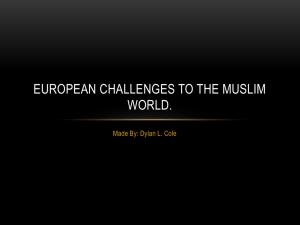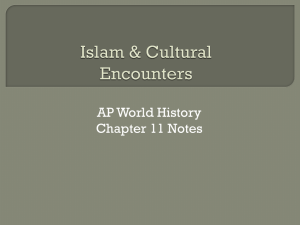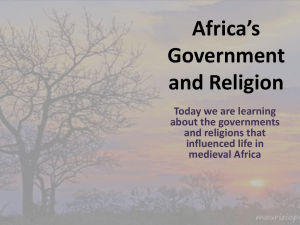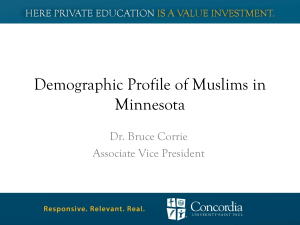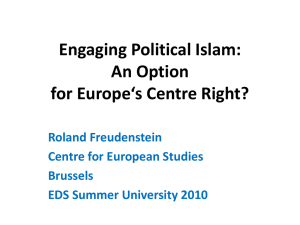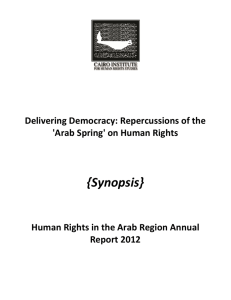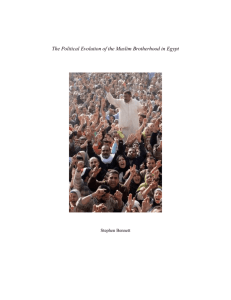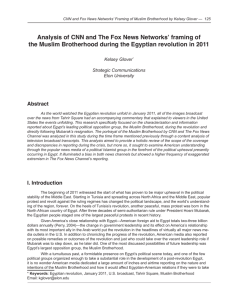Relations with the West - the Defence and Security Forum
advertisement
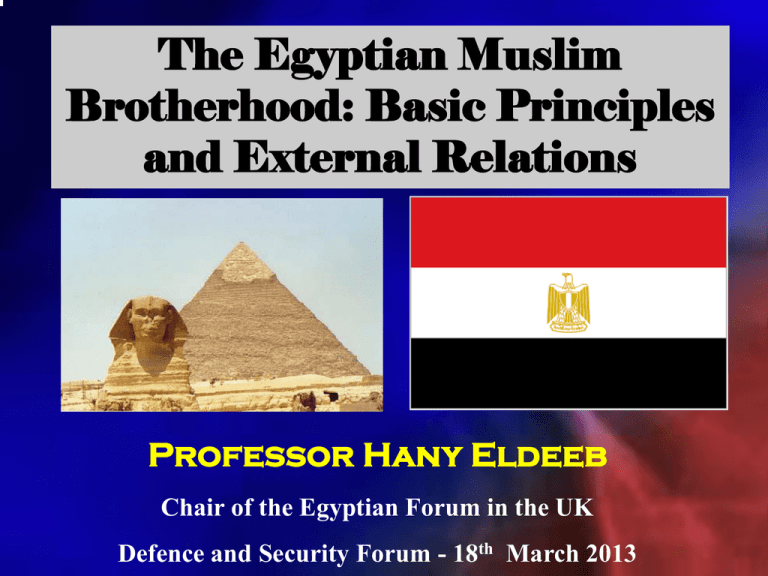
The Egyptian Muslim Brotherhood: Basic Principles and External Relations Professor Hany Eldeeb Chair of the Egyptian Forum in the UK Defence and Security Forum - 18th March 2013 Historical Background Imam ( Mr) Hassan Alanna founded the Muslim Brotherhood in March 1928. Judge scientist Solicitor Judge Business man Teacher / Prof Main Principles The MBH is aiming at Re-instilling Islam in the daily Muslim’s life. Islam is a way of life. The movement opposes violent means to achieve its goals General Views • Political Islam • Sharia Law • What is Sharia : 1-faiths 2- worship 3- morals 4- transactions 5- Provisions Structure Guidance Office (General Guide) Governorate Governorate Region Region Branch Family Governorate Region Branch Family Region Branch Family Governorate Branch Family Family The Muslim Brotherhood is financed by contributions from its members, who are required to allocate a portion of their income to the movement. Strength of MBH 1- Simple ideology 2- Strong Structure 3- Self Funding 4- Continuous revive International relations International relations General principles 1- Acknowledgment of differences. 2- Respect of religious beliefs and values. 3- Establishing real partnership and cooperation 4- Respect and guard common human values like justice, human rights, democracy, dignity and freedom. General principles II 5-Respect people’s choice 6- Support of armaments control efforts and support of directing defence expenses to humanitarian efforts. 7- Support of restructuring international organisations. General principles III 8- Maintaining continuous channels of communication with all countries and organisations. 9- Facing Islamophobia and promoting a non-radical, mainstream understanding of Islam Dialogue of Civilizations • MB supports the concept of Dialogue Among Civilizations, particularly on issues such as how to foster communication between peoples and mitigate risks of violence and confrontations. • MB believes that dialogue among civilisations highlight the true image of Islam. MB views about Middle East conflict 1) With regard to the Camp David peace treaty • MB respects all treaties signed by previous governments & endorsed by the Egyptians. • MB insists that all treaties must be respected by all parties. • MB seeks comprehensive peace and regional stability, which is also the demand of the Egyptian people 2) With regard to the Palestinian Cause: • MB supports Palestinians’ consensus and backs their decision. • MB seeks to ensuring the rights of Palestinians are respected, as per international treaties. • MB will condemn human rights violations against Palestinians. 3) With regard to the EgyptianIsraeli borders: • Egyptians are very sensitive to those killed on their borders. Egyptians will not accept such aggressions on their borders. • Security in Sinai Peninsula: MB believes the way to improve security in Sinai is through development. Relations with the Gulf 2) Relations with the Gulf: • Gulf historically, was a host for MBH members who escaped the oppression. • MBH members has contributed very positively in the development of Gulf region • The MBH supports stability in the Gulf • We do not export revolutions * Gulf countries are strategic partners of Egypt 3) Relations with Iran 3) Relations with Iran * We support all countries right to the peaceful use of nuclear power. . * MB is for the elimination of nuclear weapons and all weapons of mass destruction from the whole region. *The stance against nuclear weapons and weapons of mass destruction derives from Sharia and Islamic ethics. * A war on Iran would destabilize the region and threaten democratization Relations with the West 4- Relations with the West In each Western country, positions have often changed not only with time, but also from Arab country to country. It is not uncommon, in fact, for a Western country to have held negative attitudes toward an Islamist movement in one country while seeking to engage with a very similar Islamist movement in another. The West and the Muslim Brotherhood after the Arab Spring Lorenzo Vidino,2013 Foreign Policy Research Institute Relations with the West And all Western countries change positions based on political forces, as well as occasionally from individual to individual within the same political party, generating policies that can be described as schizophrenic. , Moreover no Western country possesses a well-developed, longestablished, and cogent policy concerning participatory Islamist movements like the Muslim Brotherhood. The West and the Muslim Brotherhood after the Arab Spring Lorenzo Vidino,2013 Relations with the west Why The west has never been comfortable with Islamist groups coming to power, even through democratic means. A ) West antagonism towards Islamists is based on Islamists’ opposition to WEST strategic interests, not cultural enmity “clash of interests” In essence, interests, such as support for Israel or protection of Middle Eastern energy resources, are fixed. The West and the Muslim Brotherhood after the Arab Spring Lorenzo Vidino,2013 Relations with the west * B ) Other analysts suggest that West animosity toward Islamist groups is cultural. The United States specifically needed a new enemy after the Cold War, the argument goes, and Islamism simply became the “next ism” the country must confront. “Islamic movements, and, at times, the Islamic world and Islam, have taken the place of communism as the arch-enemy.” The West and the Muslim Brotherhood after the Arab Spring Lorenzo Vidino,2013 Relations with the west * C ) A third group of authors view suggest that West policy largely is a consequence of the policymaking process itself. In the case of the Brotherhood, barriers to information sharing among government agencies, ignorance about Islam and Islamists, and elected officials’ reliance on Muslim constituencies largely explain the varying policy responses to Islamist groups. The West and the Muslim Brotherhood after the Arab Spring Lorenzo Vidino,2013 Relations with the west This suggests that if officials possessed better information, either because they were simply willing to learn more about Islamist groups, or because governments engineered better information-sharing policies, then a more unified Islamist policy would emerge. The West and the Muslim Brotherhood after the Arab Spring Lorenzo Vidino,2013 Relations with the west D) Israel Theory, The Mubarak and other Arab dictator regimes held great importance for the way they preserved Israel’s hegemony in the eastern Mediterranean. If these regimes fell, subsequent governments would be less likely to continue this relationship. The West and the Muslim Brotherhood after the Arab Spring Lorenzo Vidino,2013 Relations with the west * While Israeli government officials generally kept a low profile during the Arab Spring, behind the scenes they were pressuring the United States to declare outright support for Mubarak’s regime for fear of what might come after. The West and the Muslim Brotherhood after the Arab Spring Lorenzo Vidino,2013 Relations with the west * The British Ambassador to Egypt, James Watt, said the group was entitled to take part in the country’s transition to democracy and downplayed concerns about the organization. The French Foreign Minister, Alain Juppe, also signalled that France would be “willing to talk to everyone” in Egypt, including the Brotherhood and even suggested that France had previously been misled by Arab governments about the true nature of the group. Relations with the west * A spokesman for Baroness Ashton, the European Union’s High Representative for Foreign Affairs and Security Policy, had said, when asked about the Muslim Brotherhood, that the EU was “open to dialogue with anyone who is interested in democracy.” The West and the Muslim Brotherhood after the Arab Spring Lorenzo Vidino,2013 Relations with the west • Joshua Stacher 2008 (Representatives of western governments should seek more opportunities for dialogue with political opposition groups in Egypt, including the Muslim Brotherhood [they] must be more willing to engage with the Brotherhood on the basis of what it says and how it acts, rather than treating it as an inflexible and dogmatic religious organisation with which there can be no common ground). The West and the Muslim Brotherhood after the Arab Spring Lorenzo Vidino,2013 Relations with the west MB Vision *We are seeking positive relations with the west based on mutual benefit and understanding * The changes after the revolution are in favour of a better relationship * A democratic Egypt is a better partner of the west Relations with the west MB Vision · MBH believes it is important to invest in this relation and take it a step further, but there are challenges · We would like to help combat antiWesternaization, but this requires actions from the West to help diminish that. * West have a moral responsibility to Egypt as they have been supporting an oppressive regime for 30 years. Relations with the west MB Vision Hasan AlBanna ( Towards the light 1947) *( Those who think that being islamist will widen the Gap between us and the west are living in illusion. Islam has established the most honoured and respected international relation) Relations with the west MB Vision Hasan AlBanna ( Towards the light 1947 ) (Do not stand in the way of our freedom and you will see from our souls strong barrier acting against destructive principles, and we will bring to the whole world the meaning of true tranquillity and lasting peace.) Aspiration of Egyptian MB Aspiration of Egyptian MB 1- Long Term: a) Establishing a free civil democratic state that respect law and maintain human rights and providing social justice b) Restoring Egypt position as a key player and modulator at the regional and international levels. 2- Short term: a) Secure the essential needs for the Egyptian especially the most deprived group. b) Radical reform of the corrupted political , social, security, and organizational system in Egypt. Revive within Muslim Brotherhood * Apart from the well established religious pillars, every thing else is debatable and liable to change. * There is no one opinion within MB * We Do not claim that we are perfect but we do our best to learn and move forward. * The more interaction with the community and the external actors, the more and the quicker the change will occurs within MBH. Conclusion MB is the most popular Islamic group in the world. We have been subjected to oppression within Muslim countries and intended neglect from the international community. We are seeking positive relation with the whole world based on mutual respect regardless if MB is in power or not. We understand that there are challenges in improving our relation with the west and we need continuous mutual efforts to tackle that.




